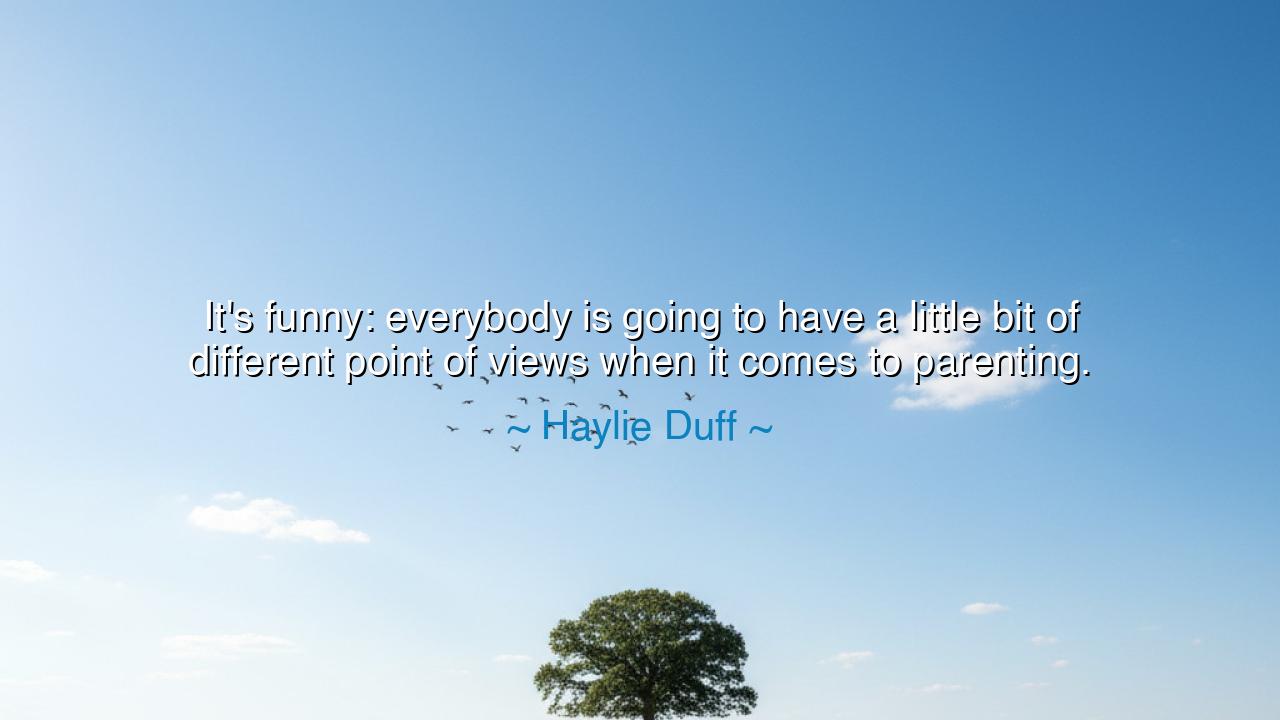
It's funny: everybody is going to have a little bit of different
It's funny: everybody is going to have a little bit of different point of views when it comes to parenting.






Hearken, O children of generations yet to rise, and attend to the words of Haylie Duff, whose voice carries the quiet wisdom of observation: “It's funny: everybody is going to have a little bit of different point of views when it comes to parenting.” In this simple yet profound utterance lies a recognition as old as humanity itself: that the raising of children is as varied as the human spirit, shaped by experience, temperament, and understanding. There exists no single path to virtue, no uniform measure of care, only a tapestry of approaches, each colored by the heart and mind of the parent.
The origin of this reflection rests in Duff’s life as a mother navigating the complexities of nurturing in a world abundant with advice, expectation, and judgment. She observes the divergence of opinions, the myriad methods and philosophies, and the inevitable conflicts they provoke. From this, she discerns a timeless truth: that parenting is as much about individual insight and context as it is about universal principles, and that respect for difference is essential to understanding the sacred labor of raising children.
The meaning of her words is both practical and moral. Each parent brings their own temperament, values, and experiences to the act of nurture. To recognize that everybody has different points of view is to honor the diversity of methods while seeking the common aim: the well-being, growth, and guidance of the child. Duff teaches that judgment and comparison often cloud wisdom; instead, one must observe, learn, and reflect, embracing both diversity and purpose in the household and in society.
Consider the example of John and Abigail Adams, whose children were raised with differing emphases on discipline, curiosity, and independence. John prized rational instruction and civic responsibility, while Abigail emphasized moral character and empathy. Though their methods diverged, their combined guidance nurtured children capable of leadership, reflection, and moral courage. This historical instance mirrors Duff’s insight: the diversity of approach, when united by love and attention, can yield rich and enduring growth.
Duff’s words also carry a subtle admonition: the recognition of differing viewpoints does not mean abandoning discernment or responsibility. Diversity of method must be tempered with wisdom, reflection, and attention to the child’s needs. Parents must learn to navigate the plurality of advice, integrating insight from experience, community, and tradition, while remaining faithful to the child’s unique nature. In this, the parent becomes both observer and interpreter, discerning the truth that lies beyond rigid instruction or opinion.
The lesson for future generations is luminous: embrace the plurality of perspectives in parenting, recognizing that each approach carries its own merit and its own limitations. Honor the variety of methods, but ground them in reflection, love, and consistency. The well-being of the child is shaped not by adherence to a single doctrine, but by attentive presence, intentional guidance, and the wisdom to discern what serves growth, virtue, and joy.
In practical life, one may follow Duff’s counsel by listening to the diverse voices of experience, seeking knowledge, and yet remaining attuned to the particular needs and temperament of the child. Engage with differing methods with curiosity rather than judgment. Observe what works, reflect on the outcomes, and cultivate a balance between guidance and respect for individuality. In doing so, one navigates the richness of human experience, allowing wisdom to emerge from diversity.
Thus, O children of future ages, carry this teaching as both lamp and mirror: the diversity of viewpoints in parenting is both inevitable and instructive. Honor the multiplicity of methods, learn from observation, and act with love, reflection, and discernment. In this way, children are nurtured not by uniformity alone, but by the rich interplay of experience, wisdom, and care—a legacy that endures across generations, shaping spirits with both freedom and guidance.






AAdministratorAdministrator
Welcome, honored guests. Please leave a comment, we will respond soon